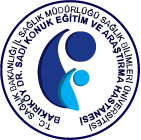ABSTRACT
Objective:
In our country organ donations have not been achieved at the desired level and the reason of this issue is that social consciousness in this regard has not been created yet. In this study, the aim was to determine the relationship between the attitudes of patients’ relatives towards organ donation and their social profiles.
Material and Methods:
Of 206 subjects who agreed to participate in the study among patient’s relatives of the inpatients hospitalised in Yedikule Chest Disease Education and Research Hospital between September 5th and 11th of 2011, were included in the study. Sociodemographic characteristics and the attitudes of the participants were collected with a questionnaire prepared by the investigators. Percentages, one-way analysis of variance (ANOVA) test and Student’s t-test were used to analyze the results.
Results:
The results showed that 88.3% of the participants did not donate organs to date, 45.6% did not know where to apply for organ donation, 62.1% has no information about the subject and 74% were approving organ donation. 40.8% were hesitant to donate the organs of a relative when he/she lost his/her life. We determined that subjects who are male, single, college graduate, worker, with a high economic status, without a chronic disease, who follow the news, who make use of their spare time properly, with non-crowded households and who are from Aegean region had positive attitudes about organ donation and transplantation; whereas participants who are female, married, illiterate, housewife, with low economic status, with a chronic disease, who do not follow the news, who do not have free time at home, with crowded households and who are from Black Sea region were found to have negative attitudes (p<0.05).
Conclusion:
Public education about organ donation and transplantation and a positive attitude on this issue are very important to increase the number of organ donations. The level of education, socio-cultural characteristics and general perspectives of the target audience should be identified and training should be based on these characteristics.



